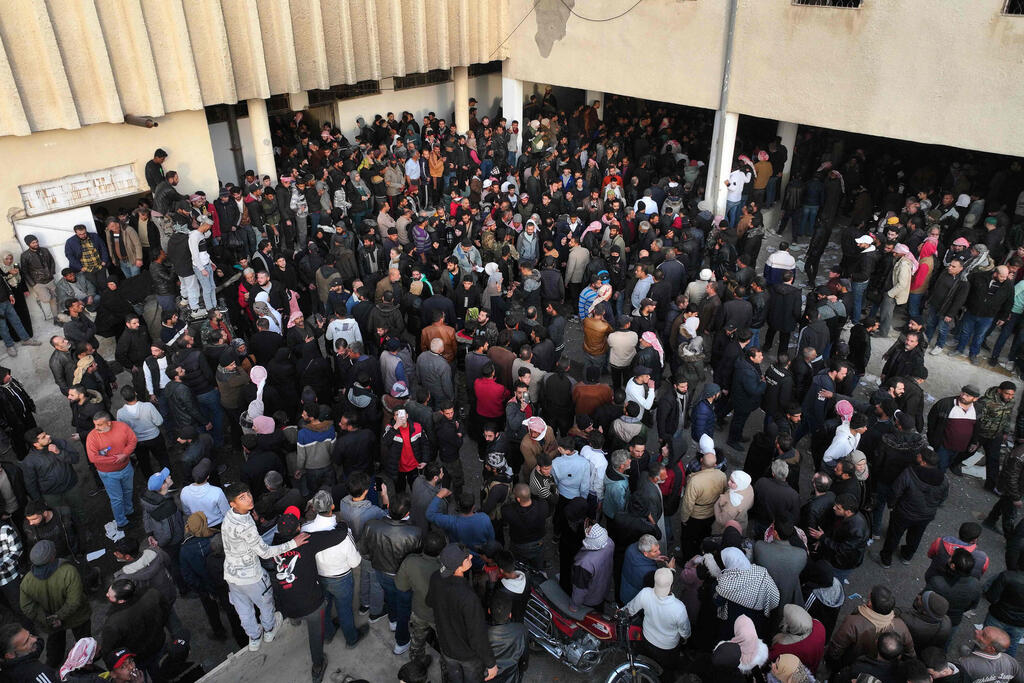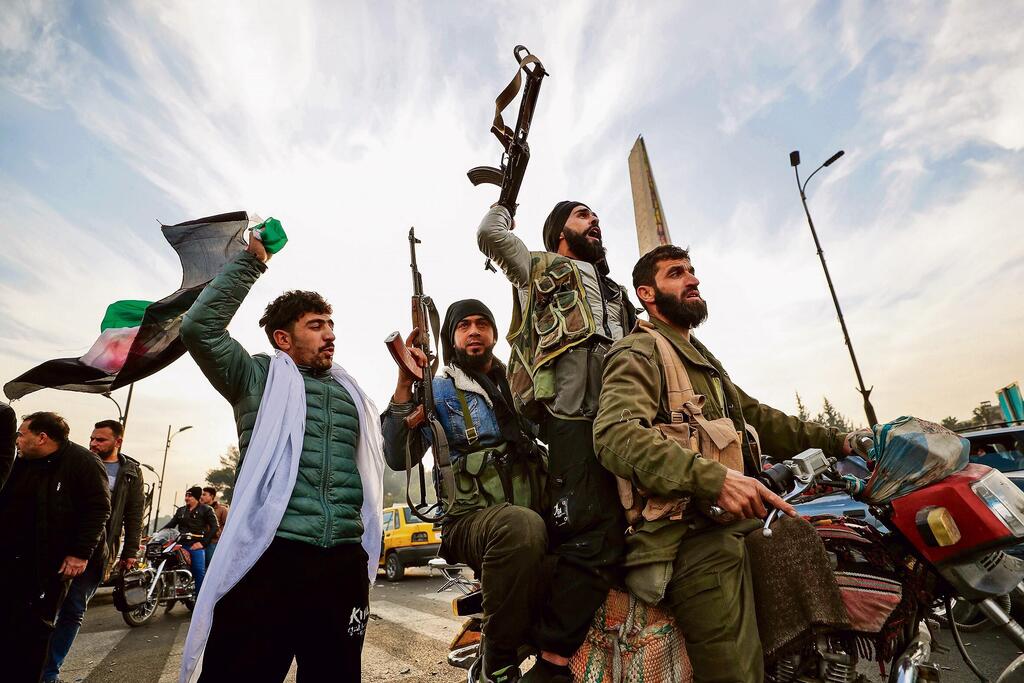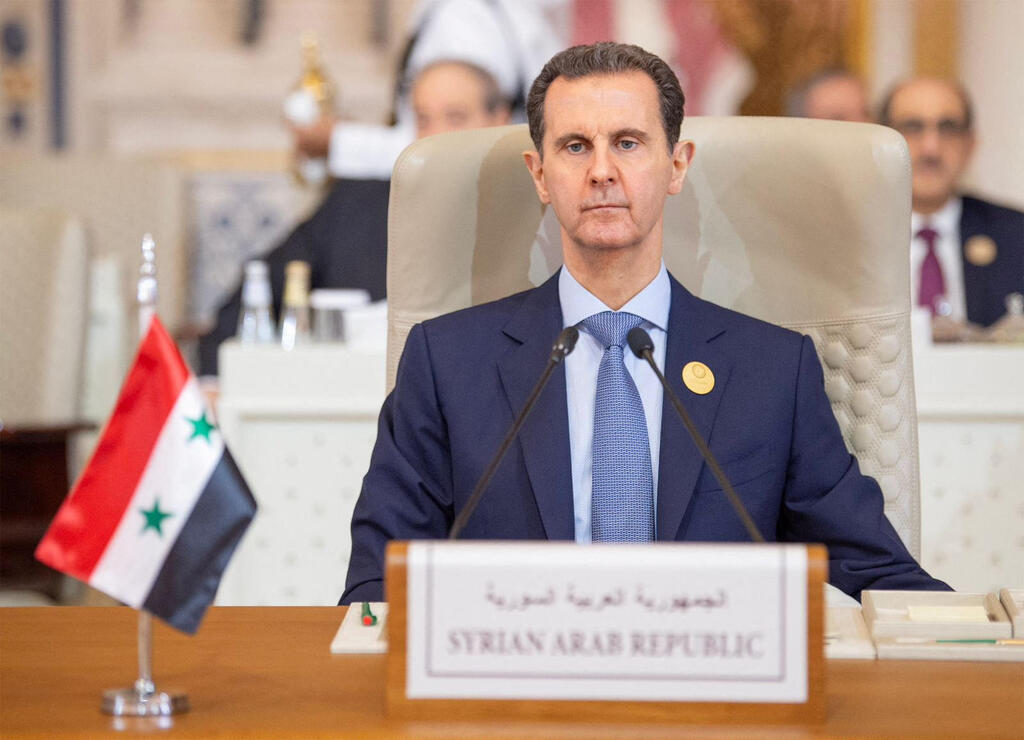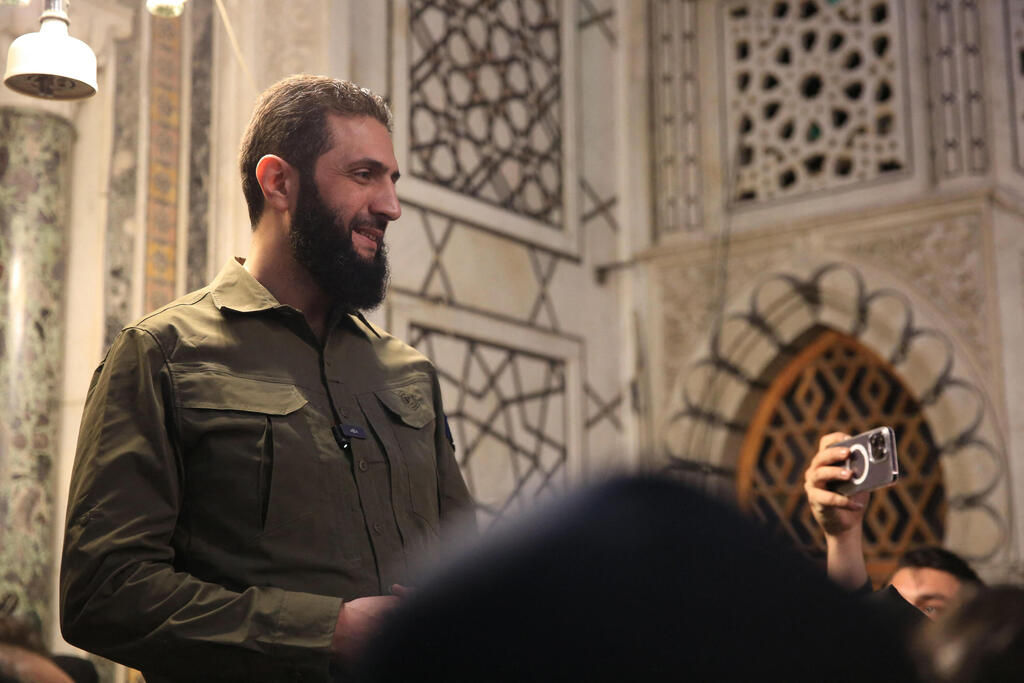The Middle East often brings prolonged and grinding tragedy for all of us. Yet there are very few historic moments—those that change everything. One such moment was October 7. Another occurred this week when Damascus fell.
The Iranian axis no longer exists. Until just a few weeks ago, the regime in Tehran could send a truck from southern Iran, travel north through mullah-friendly Iraq, cross into Syria’s eastern border—where it would be welcomed by a regime that served them—and proceed via Damascus all the way to Hezbollah on the Mediterranean coast in Beirut. With Syria's collapse and the severe blows to Hezbollah, that is no longer possible. Decades of investment and hundreds of billions of petro-dollars by the Iranians have gone down the drain.
Iran’s proxy strategy—the network of operatives it built against Israel—once seemed effective and intimidating. But it turns out that slain Hezbollah leader Hassan Nasrallah’s "spiderweb" metaphor wasn’t about Israel, but rather Iran’s network.
Iran’s proxies were supposed to protect it, but in the end, it was dragged into defending them—and failed. This week, Iran’s Supreme Leader Ayatollah Ali Khamenei was filled with accusations. His bitterness will bring satisfaction to anyone seeking peace in the region.
That said, there are no illusions about Damascus. Even there, we will be on our own. “The rebels have won,” an Israeli security official told his American counterpart, who immediately corrected him: “Don’t say rebels, they’re jihadists. Terrorists.” The Israeli official didn’t need the reminder; he was overseeing an IDF operation to eliminate Syrian army capabilities.
The prevailing view in Israel’s security establishment is that Shiite jihadism has been replaced by Sunni jihadism. For now, the new regime will persuade the world it isn’t al-Qaida and will attempt to take control of the entire state and restore order. But in a year or two, it will begin framing the return of the Golan Heights as a sacred Islamic mission.
Even before addressing the dire predictions—realistic as they may be—it must be said outright: Syria has been freed. From the depths of the Syrian desert to Idlib province, from the torture chambers of Saydnaya prison to the markets of Aleppo, from the streets of Beirut to the borders of Iraq, and across the entire Middle East, this is a revolutionary reality.
The Assad dynasty was not only, or even primarily, a link in the so-called "axis of resistance"; it was a symbol of a stagnant, dictatorial regime akin only to North Korea—a place frozen in time.
For Syrians themselves, the fall of Damascus was less significant than the liberation of Saydnaya prison—the site where tens of thousands were executed and countless others vanished.
4 View gallery


Large crowds gather outside the infamous Saydnaya prison
(Photo: OMAR HAJ KADOUR / AFP)
Videos emerging from the prison this week revealed the sheer magnitude of the horror: the gallows, the bodies dissolved in acid, the prisoners forgotten in underground cells, the execution lists. Some prisoners had been there for decades, knowing nothing of the outside world. Stories even surfaced of children born inside the prison.
Saydnaya was the ultimate symbol of the regime's boundless brutality. This week, families from across the country flocked to the prison, searching for loved ones who had disappeared. In nearly every case, they found nothing. The regime had erased its opponents—and any trace of their existence.
The Syrian butterfly effect
There is a lesson here. No building on any Western university campus was seized in solidarity with the Syrian people. No fiery protests were held at prestigious campuses while hundreds of thousands were being slaughtered. Unlike the Israeli-Palestinian conflict, this war lacked a simplistic, false narrative of “white oppressors” and “indigenous victims.” As a result, Syrian blood was deemed expendable. The war was treated as an unfortunate but immutable reality—and then forgotten.
The Syrian refugees I’ve spoken to in Europe were filled with boundless disappointment at the West, which they felt had abandoned them. And it must be said: they were undoubtedly abandoned.
The key moment came in 2012, when U.S. President Barack Obama issued a “red line” warning to the Assad regime, demanding it refrain from using chemical weapons against its own people. Assad ignored the warning and massacred scores with nerve gas. The U.S. and Britain prepared a response—limited airstrikes. The rebels believed such action could topple Assad’s faltering regime.
But then came a turning point of weakness. The American public, scarred by Iraq, was so averse to further Middle Eastern conflicts that it opposed even airstrikes. In other words, Syrians were left to choke.
Obama’s resolve collapsed in record time. His administration briefed that he reversed course after a contemplative “walk” with his chief of staff across the White House lawn. A romantic and vivid image: a stroll on Washington’s tranquil grass while Syrians suffocated.
The consequences were catastrophic. Obama accepted a proposal from Russian President Vladimir Putin, a cunning initiative from Moscow’s czar. Syria’s chemical weapons would be removed, and in return, the West would refrain from striking. But several things happened: Russia entered Syria with overwhelming force while the U.S. barely reacted.
The disarmament process dragged on, and it became clear not all chemical weapons had been removed. Moreover, the relevant conventions didn’t classify chlorine as a chemical weapon, allowing Assad to use it freely in the years that followed.
Like a nuclear reactor meltdown, Syria became increasingly toxic. ISIS took control of 40% of the country and declared an Islamic Caliphate. This hardly disturbed the West until the group began beheading foreigners and Christians. We live in a world where the image of a single beheading carries more weight than the deaths of thousands who were simply shot.
Meanwhile, the refugee crisis in Europe erupted after Assad, encouraged by the Russians, began pushing his own people out of Syria. Syrians crossed the sea from Turkey to Greece, some perishing along the way, and hundreds of thousands arrived in Europe.
Refugees are rarely welcomed, and Germany reached an agreement with Turkish President Recep Tayyip Erdoğan to stem the flow of Syrians into the continent. But it was too late; the Syrian civil war—a conflict few paid attention to, in a remote country with no vast oil reserves—had already played a decisive role in Brexit. Brexit (along with the refugee crisis and its images) then contributed to Donald Trump’s rise in 2016.
Would all this have happened without the Syrian war? Perhaps. But it played a crucial role. The butterfly effect of Syrian suffering unleashed hurricanes—not one, but many.
The tragedy lies in the persistence of this situation: the slow, grinding history of suffering. Assad’s regime was weak from the start of the war but managed to maneuver its way forward. Hezbollah saved him, followed by the Revolutionary Guards and Iran, and then the Russians. The Americans eventually entered Syria, primarily to fight ISIS. Yet the prevailing perception was that Assad couldn’t be toppled, with Russia and Iran backing him.
As reported earlier this week by Ynet’s sister publication Yedioth Ahronoth, Israeli Military Intelligence (Aman) had assessed that the Syrian army was gradually recovering. This assessment, though grounded in material terms—acquisition of weaponry, training and improved command and control—proved to be a mistake. As history has shown, regimes don’t collapse solely due to material factors.
A Syrian Army drill
In his final hours before fleeing to Moscow, the sanctuary for deposed dictators, Assad still didn’t grasp his reality. Western intelligence sources observed astonishing scenes in real time: the dictator raged uncontrollably. He accused his generals of corruption and blamed the army for its failures. He tried every trick in the book—offering last-minute proposals to the West and Gulf states, issuing threats and attempting bribes. He was even convinced that he had another division at his disposal, only to discover it had vanished. None of it worked.
Get the Ynetnews app on your smartphone: Google Play: https://bit.ly/4eJ37pE | Apple App Store: https://bit.ly/3ZL7iNv
Therefore, it is essential not to dismiss the pure joy of Syrians at the fall of their oppressive regime or underestimate their desire to build a new state. Assad’s supporters in the West mourned the dictator’s downfall this week, labeling his successors as “Woke Al-Qaida.” Many of these figures, like George Galloway and Max Blumenthal, are among the most vocal anti-Israel voices. It was a delight to witness their profound frustration and the disarray of anonymous social media accounts, likely managed from Russia, as they scrambled for explanations.
The Russians, who poured a fortune into Syria, were quick to search for scapegoats this week—blaming Assad himself, and, when desperate, even pointing fingers at Israel’s “imperialism.” Assad is now a guest-prisoner in Russia, where Moscow is already considering the next dictator. Assad should know that the empire won’t abandon him, even if the masses demand his hanging.
The blow to Moscow is severe and could deepen if Russia is forced to vacate its naval base on the Mediterranean coast in Tartus. In this sense, what happened in Syria stands out amid global trends of recent years: consider where, in recent memory, Iran and Russia have retreated, or where people have freed themselves from an iron grip.
Who's next on the chopping block?
Official and unofficial Israel celebrated the fall of Assad’s regime this week and the dramatic shift—largely credited to the actions of the IDF and the defense establishment—since October 7. These celebrations are entirely understandable. It’s no coincidence that U.S. National Security Advisor Jake Sullivan is visiting the country. Beyond urgent matters, there’s a legacy at stake. In its final moments, the Biden administration is attempting to claim credit for the dismantling of the so-called “axis of resistance.”
Prime Minister Benjamin Netanyahu attributed the success entirely to himself, and not even the opening of his trial dampened his euphoric mood. Mistakes, as usual, were quick to follow. Perhaps there was significant strategic value in seizing the Syrian Golan Heights and taking control of the buffer zone. But it’s doubtful Israel gained anything from the boastful declarations and high-profile visits by the prime minister and defense minister to the Golan Heights.
Golani’s announcement of a free-market economy and a ban on acts of revenge was interpreted in the West as a serious gesture toward the future. Simultaneously, his men executed one of Assad’s relatives by hanging him from a crane, filming the act and posting it on Telegram
Israel said it all this week: it threatened Syria, bragged about bombings there, expressed interest in “relations” as Netanyahu put it and issued further warnings about Iranian involvement. For the first two days, the world remained silent about Israel’s incursion into Syria, but at some point, the noise from public declarations became deafening.
I can only commend the military press corps for securing a tour across the Syrian border. They did their job diligently. But what exactly is the point of presenting a temporary occupation—as described in the Cabinet meeting—as some sort of achievement, especially when it was accomplished without a fight?
The Israeli establishment, jubilant, was swept into an internal competition over credit. The result: within a short time, the Middle East—and even European nations—woke up and began demanding an Israeli withdrawal. Israel injected itself into the narrative and, in doing so, became the story.
Following Defense Minister Israel Katz's statement—where he threatened that anyone following Assad’s path "will end like Assad"—military historian Prof. Danny Orbach wrote on his Facebook page: "There is a new regime in Syria. Its leaders barely talk about us. Even if they are deeply hostile to Israel, they are even more hostile to Iran. This creates an opportunity to build bridges for cooperation, even after Assad’s arsenal is destroyed. Why, for heaven’s sake, send them every possible signal that ‘Israel is your enemy’?”
Silent amidst this was Abu Mohammed al-Golani, Syria’s new ruler. A shrewd and ruthless leader, he seems to have learned lessons from the fall of ISIS—his sworn enemy—and the crushing of al-Qaida, his former roots. Despite Israel’s devastating strikes on Syria’s military infrastructure and its entry into the Syrian Golan, Golani refrained from issuing threats against Israel or the West. His announcement of a free-market economy and a ban on acts of revenge was interpreted in the West as a serious gesture toward the future.
The West, however, takes such declarations far too seriously. Simultaneously with these signals of goodwill, Golani’s men executed one of Assad’s relatives by hanging him from a crane, filming the act and posting it on Telegram. Across Damascus, arrests and purges have begun. Assad's father’s grave was torched.
This isn’t the end. Western intelligence is closely monitoring developments in Lebanon, where Sunni and Christian elements are likely to seize the opportunity to move against Hezbollah. It is not unthinkable that Israel is waiting for this scenario to unfold. The final neutralization of Hezbollah can only occur through a united Lebanese effort to strip it of its weapons. If this doesn’t happen now, in the wake of Assad’s flight, it is doubtful the Lebanese will ever be able to free themselves from Hezbollah’s grip.
Another critical issue for Israel and the United States is the Kurds. Western intelligence agencies are still trying to discern the nature of the relationship between Hayat Tahrir al-Sham (HTS), its leader Golani and Turkish President Erdoğan. There is no doubt about their cooperation in intelligence sharing, weapons transfers and long-term strategic goals. The question, however, is whether Turkey merely influences the new Syrian regime or exercises full control over it.
A clue came shortly after the takeover of Damascus: Erdoğan reportedly asked HTS to address the Kurdish issue. Despite HTS’s ongoing conflict with another pro-Turkish opposition force, the Syrian National Army (SNA), Golani quickly complied. The Kurds are historic allies of Israel, serving as a counterweight to countless groups in Syria and Iraq that seek Israel’s destruction. The United States has stepped in to halt the assault on the Kurds, a move likely influenced by Israel, which has reportedly leveraged its sway in Washington—under both Biden and Trump—to protect Kurdish autonomy.
The concern was a swift dismantling of Kurdish self-rule and a dramatic rise in Turkey’s power in the region. This has left the U.S. in a peculiar position: two NATO allies, the U.S. and Turkey, are pursuing completely opposing goals in Syria. Turkey is waging a determined campaign to dismantle the Kurdish administration, while the U.S.—at least the current administration—is committed to defending it. About 1,000 American troops are stationed alongside Kurdish forces, and as long as they remain, Erdoğan and pro-Turkish forces are unlikely to push for a decisive victory.
However, on January 20, Trump will be inaugurated as president of the United States. A battle is now unfolding in Washington: pro-Israel advocates are working to preserve Kurdish interests, while Turkey’s supporters—less visible but not insignificant in D.C.—are lobbying for the opposite. The “new Syria” is bound to bring many more upheavals. Damascus has fallen, but it remains unclear what will rise in its place.








